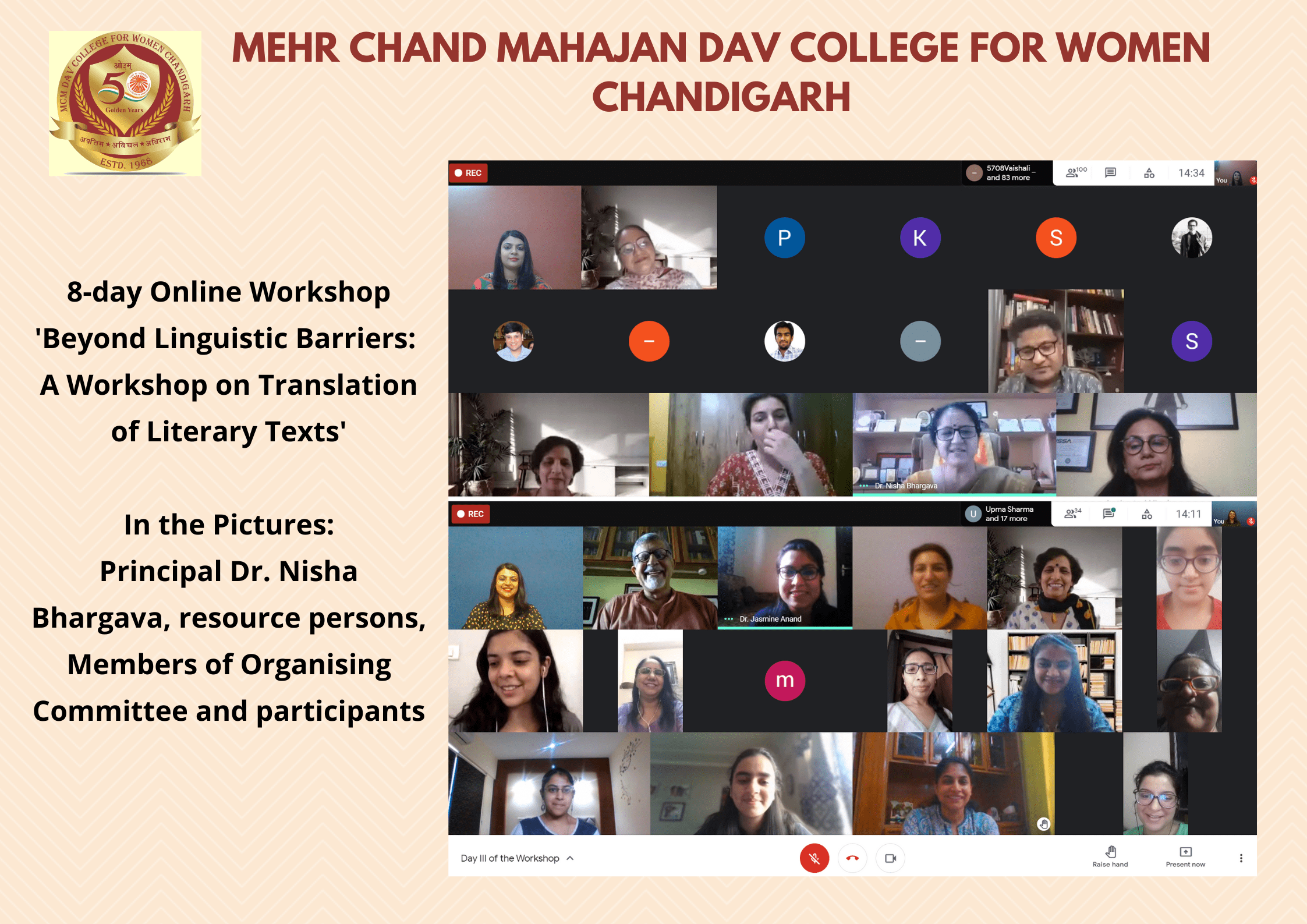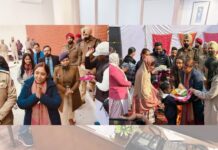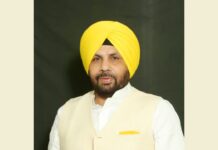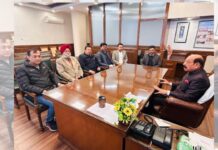The 8-day online workshop titled ‘Beyond Linguistic Barriers: Workshop on Translation of Literary Texts’ organised by the Postgraduate Department of English, Mehr Chand Mahajan DAV College for Women culminated successfully. The workshop witnessed intellectually invigorating deliberations on the art and craft of translation by Prof Akshaya Kumar, Chairperson, Department of English and Cultural Studies, PU, Prof. Deepti Gupta, Department of English and Cultural Studies, PU, Prof Rana Nayar (Retd.), Department of English and Cultural Studies, PU, Dr. Chander Trikha, Director, Haryana Sahitya Akademi and Haryana Urdu Akademi, Panchkula, Dr. Ritu Bhanot, Department of Hindi, Dev Samaj College for Women and Mr. Daljit Ami, Documentary Filmmaker and journalist.
The workshop began with a session on ‘An Introduction to the Theories of Translation’ by Prof Akshaya Kumar wherein he emphasised on the Indian theories of translation and highlighted the need to approach translation as a creative activity as opposed to transferring the information objectively. Using a variety of anecdotes, Prof Akshaya made it easy for the participants to understand the significant theories and perspectives on translation. The sessions on the second and third day of the workshop were conducted by Prof Rana Nayar on the topic ‘Translations as Social Documents’. Reflecting on the debate of syntactic and static equivalence in translation and the significance of culture and context in the Translation Studies, Prof Nayar shed light on the process of translation and how the aspiring translators need to confront a variety of issues during this process. On day 4 of the workshop, speaking on ‘Challenges and Opportunities in Translation’, Dr. Ritu Bhanot established the need of translations to bind together various human emotions and also deliberated upon the need to research and revise one’s translations. Dr. Bhanot explained the process, opportunities and challenges of translation clearer with anecdotes from journeys of translation undertaken by literary stalwarts like Rabindra Nath Tagore and eminent figures like Mahatma Gandhi. Sharing his thoughts on ‘Translating the Untranslatable: Reliving the grandeur of Urdu Poetry’ on day 5, Dr. Chander Trikha traced the advent of translation found in the annals of Mughal history initiated by Dara Shikoh who got several Upanishads and religious texts translated from Sanskrit to Persian. He emphasised on the need of translations and encouraged the participants to look at the process and product of translation as the one of ‘giving’ rather than ‘taking’ from the original. Speaking on ‘Inhabiting the confluence of Languages: An Endless Interaction with Fluidity’ on day 6, Mr. Daljit Ami explained the responsibilities and the freedom that a translator has to comply with and enjoy too. He brought out the perspective of translation being a fluid process and how it tends to de-territorialize the language in a way. On day 7, Mr Ami deliberated upon the ideas of the translator’s role in subverting the discourses of gender. He also highlighted how translation is an act of liberation in everyday life in more senses than one. On the concluding day, Prof. Deepti Gupta delivered a session titled ‘Translation or Pipe Dream?’. Prof. Deepti discussed the various evolutionary stages of language like structuralism, behaviouralism, language being an expression of culture, having functionality, and as a cognitive and mental activity, which added to the complexities of translation. Citing Noam Chomsky, she dwelt upon the concept of ‘Language Acquisition Device’ which involves active translation when we move between languages. She defined translation as the act of finding equivalent structures while moving from one language to another where equivalence is grounded in the socio-cultural structures of the language and in the cognitive processes of the language user.
Principal Dr. Nisha Bhargava expressed appreciation for this significant endeavour of the English Department to enlighten students about the nuances of the highly promising field of translation. She asserted that by equipping students with requisite skills in translation, this initiative will be of immense value in enriching the literary world.
- HOME
- India
- National
- States
- Andaman and Nicobar Islands
- Andhra Pradesh
- Arunachal Pradesh
- Assam
- Bihar
- Chhattisgarh
- Dadra and Nagar Haveli and Daman & Diu
- Delhi
- Goa
- Gujarat
- Jharkhand
- Karnataka
- Kerala
- Ladakh
- Lakshadweep
- Madhya Pradesh
- Maharashtra
- Manipur
- Meghalaya
- Mizoram
- Nagaland
- Odisha
- Puducherry
- Rajasthan
- Sikkim
- Tamil Nadu
- Telangana
- Tripura
- Uttar Pradesh
- Uttarakhand
- West Bengal
- North India
- Agriculture
- Lifestyle
- Entertainment
- Education
- Language:

 हिंदी
हिंदी






